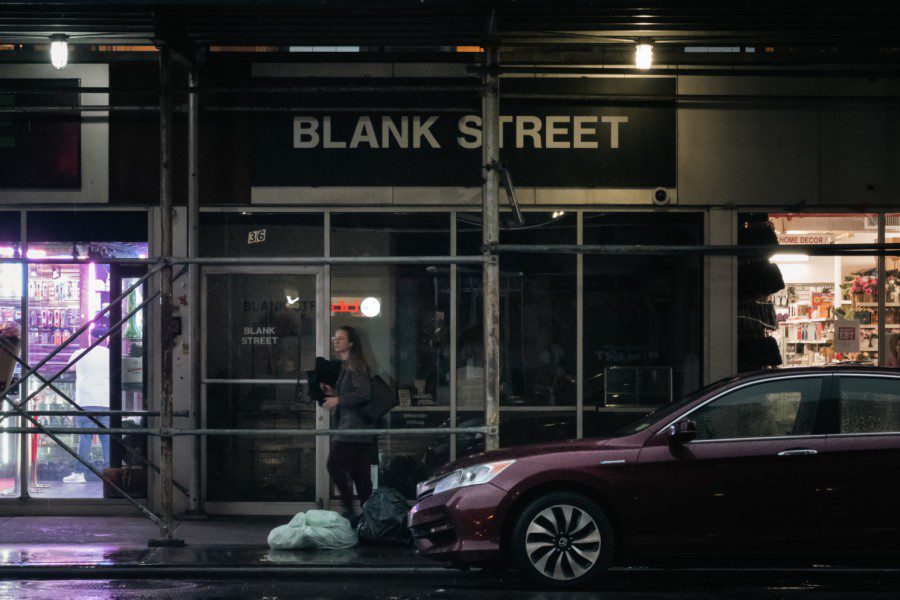Blank Street Coffee: Symbol of gentrification or new neighborhood staple?
What happens when you leave a Sternie, $67 million and an automated coffee machine in a room together? Blank Street Coffee.
What you should know about Blank Street Coffee now that they are located everywhere across New York City. (Kevin Wu for WSN)
October 14, 2022
Blank Street Coffee, the pistachio-green coffee shop, is the brainchild of 2015 Stern alum Vinay Menda and 2017 Columbia University alum Isaam Freiha. With 40 locations throughout New York City, the duo broke through an incredibly saturated market. But behind the chain’s polished exterior, skeptical New Yorkers have found a heap of venture capital funding and Machiavellian marketing plans.
You may have tried Blank Street from the cart they strategically used to park outside of the jam-packed NYU Starbucks on West Fourth St, or seen one of their flashy PR stunts on social media, such as their collaborations with Kendall Jenner’s 818 Tequila and Emma Chamberlain’s Chamberlain Coffee.
Beyond basic coffee shop staples, Blank Street features King David breakfast tacos, rum cake, and unrivaled seasonal beverages such as a “Mike’s Hot Honey Latte” and a pistachio latte for fall. In a world bewitched by October’s spell of pumpkin spice lattes, more creative drink concepts are a nice break from the norm. Whether you’re in the mood for a PSL or not, there’s no way to avoid passing by the chain on your commute to and from school.
“I always thought they were a pyramid scheme or something sketchy,” third-year Steinhardt student Sandy Ittah said.
As we sat in her kitchen next to a fridge stocked with La Colombe’s draft oat lattes, I wondered if the chain’s rapid expansion could be interpreted through maniacal conspiracy theories or the elusive command of capitalism.
“You think they’re growing so rapidly but in the end, it’s just because they’re funded,” Ittah said. “Anyone could’ve done that with that kind of start. How can local businesses compete with that kind of funding — especially as rent prices begin to surge again? Even if a business is successful, does it really mean it has the approval of customers and their communities?”
Steinhardt sophomore Ellie Rangel’s appreciation for Blank Street goes beyond thinking their coffee is great. Baristas who make the effort to engage in conversation and be friendly have left a good impression, she said. Rangel, who has a year’s experience as a barista herself, suggests this is one of the reasons she is encouraged to come back to Blank Street.
“I will say it makes me view getting coffee differently,” Rangel said. “It really shows a good coffee place when the baristas are nice to you and will talk to you.”
A focus on customer service is core to Blank Street’s business model. The use of an order-ahead app and Eversys espresso systems automates the process so that each store only needs two employees per shift and customers can get in and out quickly. Because of this, Blank Street can afford to pay their employees a guaranteed $23 per hour — better than most competitors.
Founders Menda and Freiha come from the world of tech startups. Their vision to create expedited shops gained a cumulative backing of $67 million from high-profile venture capital firms last year. Though they aim to use their capital and high-tech machinery to highlight the barista and experience of getting coffee, some still have mixed feelings about Blank Street.
“Going to a Blank Street is similar to going to another corporation like Starbucks and just buying their coffee and the money goes some distance,” Gallatin junior Mateo Villalba Rodriguez said. “Their wages are better for their employees, and they’re a POC-owned company which is good. The way I see it is, if it replaces Starbucks as a brand it wouldn’t be that much better. Since Starbucks, Dunkin’, and now Blank Street are kind of equal competition. They’re all pushing out small brands together. Overall, I still prefer small, local businesses — it’s definitely important to think about what you’re contributing to by spending your money on a brand.”
Menda and Freiha see room to open 100 operational locations by the end of this year. Blank Street recently expanded to Boston and London, but could they really be on their way to becoming the next big chain? No matter what you think of Blank Street, one thing remains clear — you can’t forget it when it lurks on every corner.
Contact Carina Christo at [email protected].
























































































































































